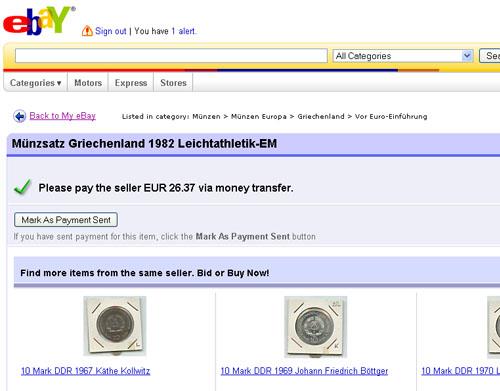Before Bidding
Become familiar with the auction site. Never assume that the rules of one auction site apply to
another. If the site offers a step-by-step tutorial on the bidding process, do it. It may save you frustration and
disappointment later.

Find out what protections the auction site offers buyers. Some sites provide free insurance or
guarantees for items that are undelivered, not authentic or not what the seller claimed.
Know exactly what you're bidding on. Read the seller's description of the item or service, and if
a photograph is posted, look at it.
Try to detitleine the relative value of an item before you bid. Be skeptical if the price sounds
too low to be realistic. "Brick-and-mortar" stores and price comparison sites may be good for reality checks.
Find out all you can about the seller. Avoid doing business with sellers you can't identify,
especially those who try to lure you off the auction site with promises of a better deal. Be aware that some
fraudulent sellers may use a forged email header that makes follow-up difficult, if not impossible. Get the
seller's telephone number so that you have another way to get in touch. Dial the number to confirm that it is
correct. Some auction sites post feedback ratings of sellers based on comments by other buyers. Check them out.
Although these comments and ratings may give you some idea of how you'll be treated, know that sometimes, comments
may be submitted by the seller or "shills" paid by the seller.
Find out who pays for shipping and delivery. Generally, sellers specify the cost of shipping and
give buyers the option for express delivery at an additional cost. If you're uncertain about shipping costs, check
with the seller before you bid.
Check on the seller's return policy. Can you return the item for a full refund if you're not
satisfied with it? If you return it, are you required to pay shipping costs?
Email or call the seller if you have any questions. Don't place any bids until you get straight -
and satisfactory - answers.
Scan through the coin auction forums (if any) for messages related to the particular auction,
the seller or the item youwish to buy.
When Bidding
Establish a top price and stick to it. This can help ensure that you get a fair price and protect
you from "shill bidding." Don't bid on an item you don't intend to buy. If you're the highest bidder, you're
obligated to follow through with the transaction. Some auction sites bar "non-paying" bidders, also known as
"deadbeats," from future bidding.
Save all transaction information. Print the seller's identification; the item description; and
the time, date and price you bid on the item. Print and save every email you send and receive from the auction
company or the seller.
Before Paying
Know and understand what form of payment the seller accepts. If the seller accepts only cashier's
checks or money orders, decide whether you're willing to risk sending your payment before you receive the product.
Protect your privacy. Never provide your Social Security number, driver's license number, credit
card number, or bank account information until you have checked out the seller and the online payment or escrow
service, if you're using one, to ensure legitimacy.
Before you agree to use any online payment or escrow service, read the service's titles of
agreement. If it's an online payment service, find out whether it offers buyers any recourse if sellers don't keep
their end of the bargain, whether it prevents sellers from accessing their funds if buyers are not satisfied with
the product, and who is responsible for paying for credit card charge backs or transaction reversal requests. If
the online payment service cannot recover the loss from the seller, it might try to recover its loss from you,
using the credit card or bank account information in its file. To limit your exposure, consider reserving a
separate credit card, stored-value card or bank account to use just for online transactions. Examine the online
payment and escrow service's privacy policy and security measures. Never disclose financial or personal information
unless you know why it's being collected, how it will be used, and how it will be safeguarded.